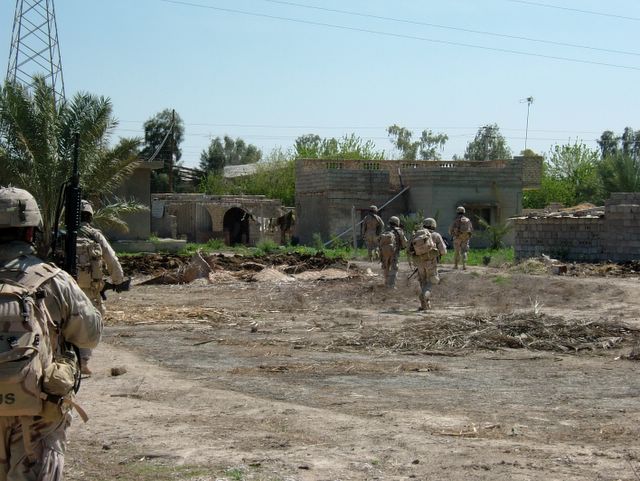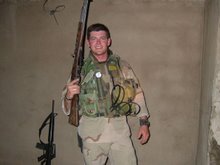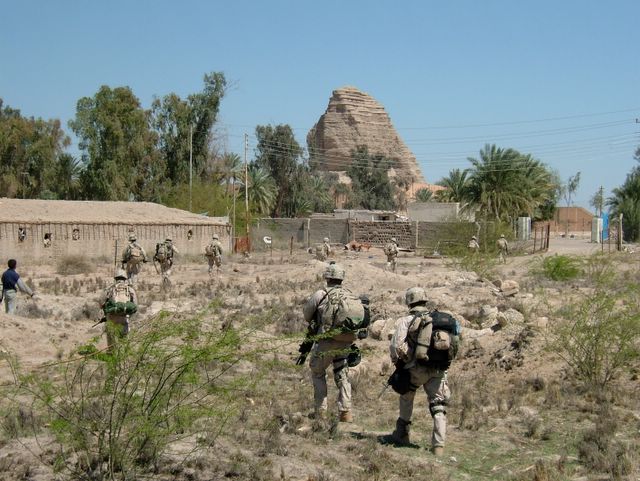"This day is revenge for Saddam"
Iraqis Rewarded for Patience at the Polls
MY Way News
By SAMEER N. YACOUB
BAGHDAD, Iraq (AP) - Trodding along streets emptied of traffic, Iraqis swarmed to polling stations Thursday, lined up patiently to be searched, pored over long paper ballots with dozens and dozens of candidate lists and then cast their votes for a permanent legislature.
Men emerged from one polling site in the capital's Sadr City neighborhood jubilantly waving hands with fingers stained with indelible purple ink to prevent multiple voting.
Policemen guarding a station in another part of Baghdad fired their guns in the air to mark the scheduled end of voting, but authorities then ordered that balloting be extended an hour because of heavy turnout across the country.
Some people walked through the streets wrapped in Iraq's flag.
In the northern city of Mosul, the streets were like a giant playground. Thousands of children took advantage of a countrywide ban on nonmilitary traffic to turn major roads into soccer fields. Families strolled through residential neighborhoods after voting.
Turnout out was even heavy in Sunni Arab areas, which mostly boycotted last January's election of an interim parliament. The mood there was often defiant, with voters from that formerly powerful minority critical of the Shiite Muslim-dominated interim government.
Omar Badry, a 28-year-old supermarket owner, said that government was "imposed by the Americans and not chosen by the people."
He said he voted for the Iraqi Accordance Front of Adnan al-Dulaimi because its leaders "always spoke out against the military operations in Sunni areas and even in Shiite ones."
Tareq Moustafa Abdullah, a 70-year-old Sunni who is a retired government employee, said he regretted not voting in January "because we ended up with people who do not know God as a result."
Ballots ran short in Fallujah, a predominantly Sunni stronghold overrun by U.S. troops a year ago. Mayor Dhari Youssef al-Arsan said 11 of the city's 35 polling stations did not get ballot boxes at all and some sites ran out of ballots in the first hours of voting.
"Participation from the people was very good and unexpected. The biggest indication is that polling sites were running out of ballots because they were not expecting so many people," al-Arsan said, estimating nearly half of eligible voters cast ballots.
Violence appeared to be light. Despite promises from major insurgent groups not to attack polling stations, a mortar shell killed one civilian near a voting site in the northern city of Tal Afar and a grenade killed a school guard near a polling place in Mosul.
Several bombs were found along major roads leading to polling stations in predominantly Sunni Arab neighborhoods and destroyed, the U.S. military reported.
After checking security at polling stations, American troops moved out of the areas and left security to Iraqi police and soldiers. In the insurgent hotbed of Ramadi, masked gunmen were seen guarding some voting sites.
Security officers searched people entering polling stations to guard against attacks. At some sites, men and women lined up at separate entrances. At others, they stood together, waiting their turn to be handed lengthy ballots.
The mood was upbeat among the country's Shiite Muslim majority and in Kurdish areas, where people expressed hope that the new government will make strides against the insurgency.
"We hope that they will bring us security and safety," 80-year-old Abbasiya Ahmad said after voting for the governing Shiite United Iraqi Alliance at Baghdad city hall.
Many Iraqis celebrated the election as another step away from the brutal reign of Saddam Hussein.
"This is day is revenge for Saddam. This is one of the times that Iraqis are free to choose their candidates," said Chiman Saleh, 39, a Kurdish housewife in the northern city of Kirkuk who had two brothers killed by Saddam's security forces in the 1980s.












